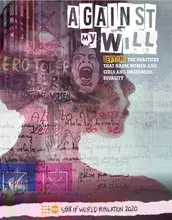GABORONE, Botswana- The Minister of Nationality, Immigration and Gender Affairs, Honorable Anna Mokgethi officially launched the 2020 State of World Population (SWOP) report on the 16 July in Gaborone, Botswana. The report, with the theme Against my will: defying the practices that harm women and girls and undermine equality, examines the origin and extent of harmful practices against women and girls around the world, and what must be done to stop them.
Honorable Mokgethi highlighted that the report comes at an opportune time as the country is facing an unprecedented increase in the number of gender based violence cases.
Many countries are reporting a surge in domestic and sexual violence cases against women and children. In Botswana, just a week into COVID19 lockdown, the womens’ shelters in the country were overwhelmed with numbers of survivors in need of safe spaces.
“Botswana has long been facing a gender-based violence crisis, with 1 in 3 women having experienced abuse in their lifetime, according to the 2018 National Relationship Study. The World Population Review (2019) places Botswana as the second country on rape cases at 92.9 per 100 000 citizens”, said Minister Mokgethi.
She emphasized that for Botswana to achieve the Sustainable Development Goals by 2030 and the Vision 2036, all stakeholders; the community, civil society organizations, men and boys need to work together and unite to end gender based violence, ensuring that no one is left behind.
“Let me assure you that my government will not relent in her effort to uproot violence against women and children. The COVID-19 pandemic presents an opportunity for us to recommit our efforts to achieve an end to GBV, which robs women and girls the privilege to enjoy their full birth rights and freedoms as enshrined in the Constitution of this country,” she added.
Botswana made a commitment at the 2019 Nairobi Summit on ICPD25 to reduce Gender Based Violence from 37% to 20% for women and from 21% to 10% for men, which the Minister pointed can only be achieved through effective implementation of the National Strategy Towards Ending GBV.
The shadow pandemic
During a panel discussion consisting of Non Governmental Organizations, Ministry of Health & Wellness and gender activists, the alarming increase in GBV in Botswana was chronicled. As the COVID-19 pandemic continues to expand globally, governments have implored residents to stay home to protect themselves and others from COVID-19. But for domestic violence victims—the vast majority of whom are women and children, —home is a dangerous place.
The five panelists were Kgomotso Kealotswe from Botswana Gender Based Violence Prevention & Support Centre, Lesego Mokganya from the Ministry of Health and Wellness, Ratanang Mosweu from Men for Health & Gender Justice, Botlogile Tshireletso, a former minister and an advocate for women and girls rights and Lorato Modongo, a youth activist.
Ms. Kelaotswe revealed that the Botswana Gender Based Violence Prevention and Support Centre (BGBVC) and Women Against Rape (WAR) reported an overwhelming increase in GBV consultations in April, during the period of lockdown compared with other periods. A total of 272 clients were provided with services during this period; 155 came directly to the organization to seek safe shelter, 67 were provided with counselling through hotline services and 50 were assisted through the short message service line.
“Before the pandemic, the organisation used to see a maximum of 50-60 clients per month. In comparison therefore, the reported numbers have doubled,” noted Ms. Kelaotswe.
Kealotswe added that they managed to open seven extra temporary shelters to accommodate all the survivors, four in Gaborone, with one being dedicated to men, one extra shelter in Maun, Kasane and Selebi Phikwe respectively.
Community engagement is key to ending GBV
Another panelist, Ms. Botlogile Tshireletso, former Minister of Local Government and Rural Development and a staunch advocate for women and girls’ rights emphasized the need for community involvement in ending gender based violence. She stressed that while actions such as improvement of the reporting and judicial systems are being improved, a lot more needs to be done in community engagements and education on the prevention of gender based violence.
“GBV is a community issue and for many women and girls, families and community members are the first line of defense against GBV, but because of the entrenched culture of silence many women and girls suffer in fear and silence,”said Ms. Tshireletso.
She added that traditional leaders should lead the conversation on ending GBV since they listen to cases at community level brought to the kgotla and should ensure that families do not hide GBV and protect perpetrators.
When delivering the UNFPA statement, Assistant Representative Ms. Mareledi Segotso reiterated that a lot more needs to be done to end gender based violence and other harmful practices to achieve the Sustainable development goals by 2030, including target 5.3 on ending harmful practices.
“Governments have made promises, enacted laws and implemented programmes to address harmful practices including GBV. Yet, the reality of girls and womens’ lives show that much more needs to be done, and at a much quicker pace if we are to achieve the SDGs,” she said.
As part of the COVID-19 response UNFPA Botswana continues to advocate and provide technical assistance to the government of Botswana to ensure that accurate GBV prevention and access to quality services for individuals at risk of GBV and survivors remains an essential service in the face of COVID-19.
UNFPA is collaborating with the Ministry of Health and Wellness and two CSOs (Botswana Gender Based Violence Support & Prevention Centre and Men & Boys for Gender Equality) to promote GBV awareness targeting women, men, girls and boys.
UNFPA also supports the national COVID-19 GBV response coordination through provision of technical support to the Ministry of Nationality, Immigration and Gender Affairs (MNIGA) to ensure that there is strengthened national capacity to prevent and respond to GBV in the COVID-19 context.
The launch attracted participants from government, civil society, young people and media houses.
~Priscilla Rabasimane



